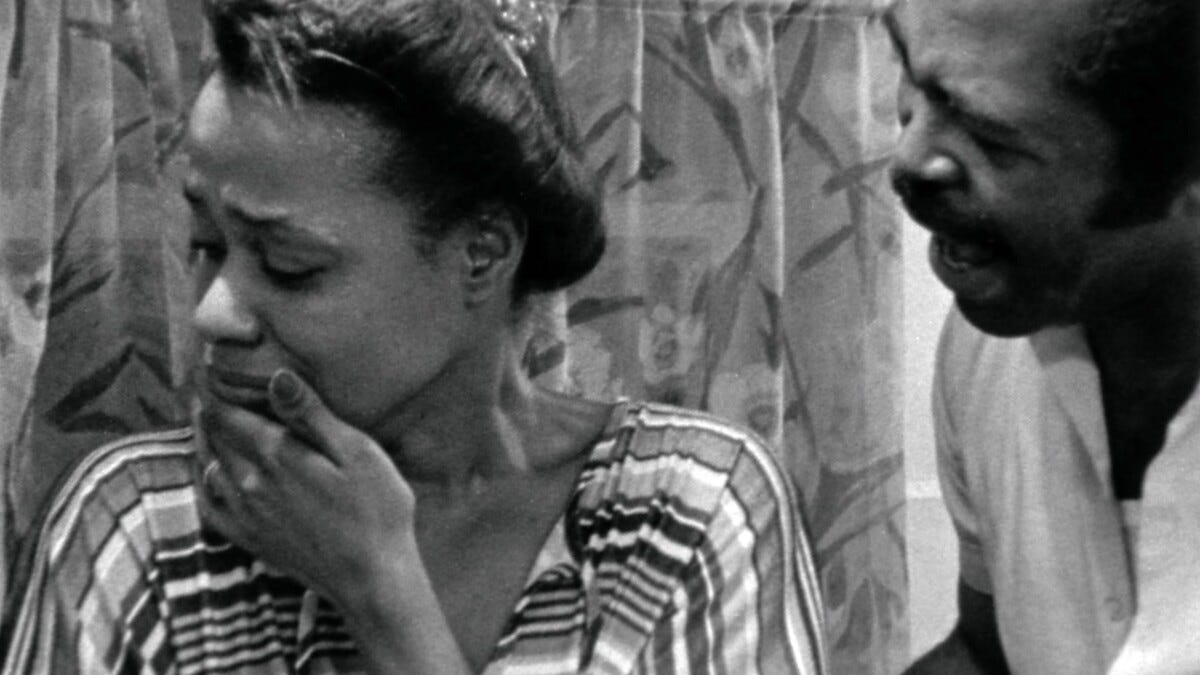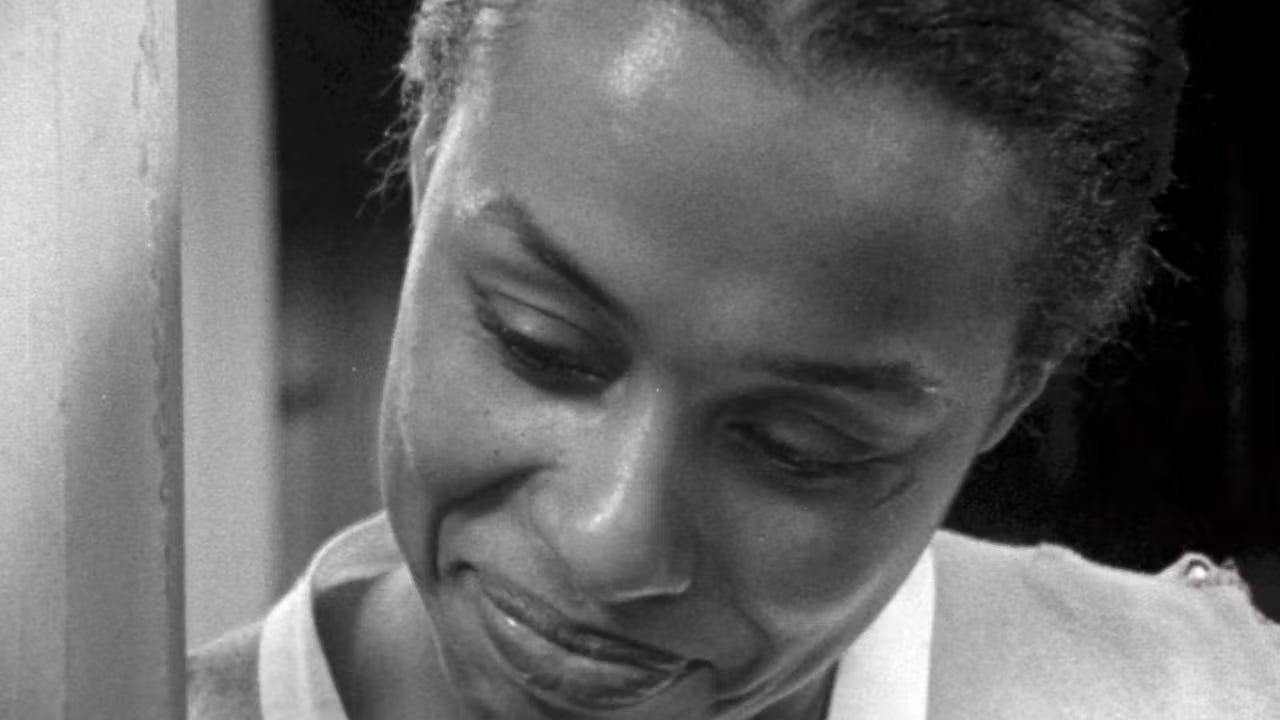Black Film Streaming Pick: 'Bless Their Little Hearts'
Billy Woodberry's Film Remains a Treasure of the LA Rebellion
Welcome back to my “Black Film Streaming Pick” series, a continuous column about Black films currently available on streaming platforms. If you haven’t already, take a look at my last pick: Leo Hurwitz’s documentary essay about post-War Black America — Strange Victory, which is still available on the Criterion Channel.
For this month I decided to highlight an LA Rebellion classic: Billy Woodberry’s bare and affecting film Bless Their Little Hearts (1984) starring Kaycee Moore and Nate Hardman.
“It’s just me who goes to work; it just me that sees to everything in this house; it’s just me that sees to the kids.” Andais Banks (Kaycee Moore) roars at her bemused husband Charlie (Nate Hardman). For over an hour, we’ve seen this married couple, fighting against the economic headwinds of their desolate, industrial 1970s Los Angeles landscape to little avail, drift apart to find that their finances are crushed; their love is crushed; their souls are crushed. In this argument, Andais speaks about the loneliness, embarrassment, and the physical and psychological pain she feels living in this unreciprocated house and country to the point of her hands shaking from the trauma. Because in Billy Woodberry’s Bless Their Little Hearts, the hands, a roadmap to a human’s entire existence, are everything.
It’s a patient, meditative film, partly owing to Woodberry needing four years to complete it while he raised money and finished his MFA at UCLA (where he met Charles Burnett). And is one of only two features by Woodberry (the poetry documentary And When I Die, I Won’t Stay Dead (2015) being the other).
Shot and written by Burnett, starring his children as the Banks kids, you can see shades of his masterpiece Killer of Sheep in Woodberry’s intimate family drama. It would however be reductive to wholly compare the two. While Bless Their Little Heart certainly carries a similar visual language born from Burnett’s love of Italian Neorealism, takes place in Watts, and takes an interest in Black folks living on the margins — this LA Rebellion movie moves with a different intention and perspective.
Jobless for a decade, Charlie either visits the employment office in search of work or performs odd jobs like painting houses or trimming weeds from empty lots. He intermittently mopes around the house, but mostly hangs with similarly out of work neighborhood friends while his wife Andais maintains the house, cooks, and works a full-time job. While she is the proverbial breadwinner, in front of their three children, she keeps up appearances by secretly handing Charlie money to give to the kids, as though he still financially runs the household.
The couple’s subterfuge, however, never fully holds back their real troubles from the view of outsiders. Their hands tell their entire story. A parallel that hasn’t escaped my mind involves Charlie shaving. After he washes his face, in an evocative close-up by Burnett, Charlie’s two large hands grip the faucet’s handles. He turns them so tight, when his young daughter enters the bathroom after him, she needs a wrench to turn on the sink. Later, a frustrated Andais rides the bus from her job back to perform more work at home. Her hand tightly grasps the bus seat’s rail as her fatigued eyes peer out the window (a similar dejection fills Charlie’s visage as he looks out a car window while driving past the derelict factories of Los Angeles). By the 1970s, the War-time industrial boom Los Angeles experienced had largely faded, leaving Black Americans jobless in economically depressed areas with little hope of ever finding financial stability.
“Lord have mercy, I would think somebody in this house would have hands beside me,” says an exasperated Andais. The piercing line marks Charlie’s physical and emotional withdrawal from his wife. In an earlier scene, the couple lie in bed, the exquisite lighting, even in the dark, enshrines the glow of their skin in the black and white photography. That same sensual glow slowly evaporates throughout the movie as Charlie views her less as a sexual partner, and more as a body to squeeze every last drip of labor from. He seeks another woman whom he can still roleplay with as the man of the house. But even that decision goes awry.
It all leads to an explosive argument between husband and wife in their kitchen. A tired Andais finally unloads on Charlie. “This scene functions as a bruising moment, where Andais and Charlie personalize the broader traumas and anxieties around the economic crisis that their family and other African Americans faced during this period,” explains Dr. Samantha Sheppard in her essay “Bruising Moments: Affect and the L.A. Rebellion” (from L.A. Rebellion: Creating a New Black Cinema, an anthology). Much of the argument was improvised by Moore and Hardman. The entire movie, in fact, is a reminder of the immense talent possessed by Moore, who also starred in Killer of Sheep and Daughters of the Dust. She recently passed away in August 2021 after spending a significant span of her life (1984-1998) as executive director of the Kansas City chapter of the Sickle Cell Disease Association.
Though her acting career was brief, even from her few film roles she left an immense mark that still has not been appropriately praised. An expert in naturalism, her face was among the most expressive in cinematic history (up there with Anna Magnani, Giulietta Masina, and Renée Jeanne Falconetti). It’s no more on display than in the argument whereby her whole body unleashes a torrent of disappointment; her eyes eviscerates Charlie’s every utterance, and her hands shake, if only to keep her whole frame from falling apart. It’s a scene that’ll sear itself in your head, reminding you of what’s possible from two totally committed performers finding comfort from a smart director in an unforgettable movie that’s a snapshot of how adverse economic pressures can weigh heavily on Black families.
Bless Their Little Hearts is available to stream on Criterion Channel. It’s also available for purchase through Milestone Films who, comparable to their work with Burnett’s Killer of Sheep, restored this film to 2K and faithfully brought it back into this world, here. Both releases are worth owning.




